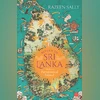Return to Sri Lanka: Travels in a Paradoxical Island
Author: Razeen Sally
Publisher: Simon and Schuster
Pages: 431
Price: £12.99
Also Read
Sri Lanka doesn’t do mild or anaemic. Everything is extravagant, lavish and immoderate, from the harsh poverty of the battle-wracked Tamil-majority north to the wealth of Colombo 7. Sally (or Salih, as his family was originally named) is uniquely placed to understand and analyse the complexities of this country. Born of a Sri Lankan Muslim father and a Welsh mother, he spent his childhood in Sri Lanka but left to spend much of his life in England, returning for short spells. He is a trade economist but unlike pucca economists, doesn’t sneer at political economy. In this book, he combines history, politics and portraits of the people who shaped his thinking and his life to write a dazzling travelogue about a country that refuses to be at peace with itself.
And this is the paradox of Sri Lanka that he captures so evocatively. Despite the commitment to constitutionalism and democracy, the country has seen brutal censorship, “disappearances” and extensive state-authorised violence. Although Tamils, Sinhalese and, to a lesser degree, Muslims intermarry and speak each other’s language, they will go to great lengths to strip each other of rights to free speech, education and property-ownership. It takes little to bring latent Sinhala Buddhist or Tamil chauvinism to the surface. And yet, he writes about the journalist Vasantha, politician Irfan, former bureaucrat-turned-educator Renton, mathematician and civil rights activist Rajan Hoole, and many others who may have had the resources to flee the frustrating and sometimes oppressive conditions in the country but have elected to stay.
The book describes Mr Sally’s idyllic childhood in the 1970s: Birthday parties, holidays and a Colombo that one can glimpse even today. Galle Face Green still hosts courting couples and boys flying kites. The surroundings of Beira Lake and Cinnamon Gardens have changed following the madness of real estate development. What has not changed is the power locus of Important People, potbellied politicians with permanently raven hair (Ranil Wickremesinghe is an exception). The lilting sing-song cadence of English spoken as Sinhala remains, thank goodness.
Mr Sally describes the landmark “colonial” hotels: The Mount Lavinia, the Taprobane and the Galle Face Hotel (GFH), at the time run by the “eccentric” Cyril Gardiner. “He gave a generous discount to non-smokers and put up edifying signs on the upper floor enjoining guests not to smoke in bed (‘It might be your last smoke’) and to use the stairs instead of the lift,” he writes. The book is replete with dry humour of this variety.
Mr Sally’s recounting of Sri Lanka’s history, especially during the Kandyan kingdom, unlocks many contemporary political riddles. He also explains with authority the distortions in Theravada Buddhism, the roots of Sufism in Sri Lanka and the quest for “pure Islam”’.
The most interesting part of the book is his travels in the north and east, the arena for the activities of the Liberation Tigers of Tamil Eelam (LTTE), the Muslim riposte to Tamil nationalism and the work of the Jesuit priests in rebuilding lives destroyed by insurgency. He does not mince words in decrying the role of Sinhalese politicians — the Sinhala Only and Standardisation policies that were seen as discriminating against Tamils — and the war that followed. Many contemporary analysts believe that the military action by the Mahinda-Gotabaya Rajapakse team that led to the killing of Prabhakaran and the end of the LTTE was the best thing that happened to Sri Lanka. Mr Sally is appalled by the triumphalism and lionisation of Mahinda Rajapaksa. He also puts on his hat as an economist to describe all the wrong policy turns taken by the Rajapaksa family that led to sovereign default in 2022 when the economy shrank by 8 per cent.
Mr Sally also takes into account the most recent developments — the Aragalaya or popular movement that led to the unseating of the Wickremesinghe regime backed by the Rajapaksa family — but notes that in order to get 5 to 6 per cent growth Sri Lanka needs structural reform going well beyond the International Monetary Fund programme. “But opposition from an entrenched political class, allied with business cronies, unions and the military, make such reforms unlikely,” he predicts.
There is a mild complaint. India has been a constant feature in the Sri Lankan discourse, especially between the 1970s and the 1990s. Mr Sally’s exploration of the “India factor” is cursory. At one point, for instance, he writes that Rajiv Gandhi… threatened to invade the north of the island”. Really? We have President J R Jayewardene telling Voice of America that seeking help from India was the only option he was left with to keep Sri Lanka united, after everyone, including China, backed out from helping Sri Lanka militarily. On the Indo Sri Lanka Accord that followed, Jayewardene told an interviewer: “Signing the Accord was a political decision. I consulted my political colleagues before I signed it. The induction of the Indian Army was a security decision and I made that decision as the Commander-in-Chief of the Armed Forces of Sri Lanka.” In Indian records, military or otherwise, there is no mention of an “invasion”, only an “invitation” from the President of a friendly country for military assistance. India has committed many sins in Sri Lanka, but military “invasion” is not among them.
For all that, this is a lyrical account of the history and politics of a country by a boy who was born there. It was hard to put the book down.

)